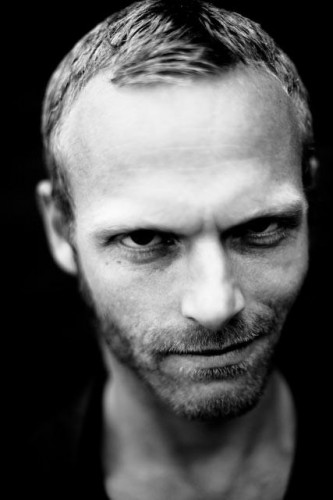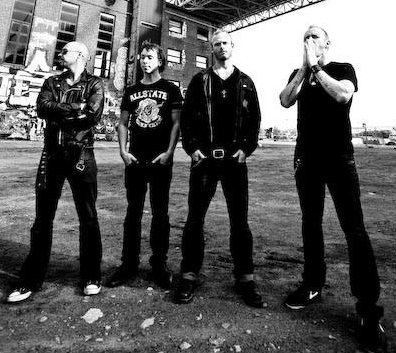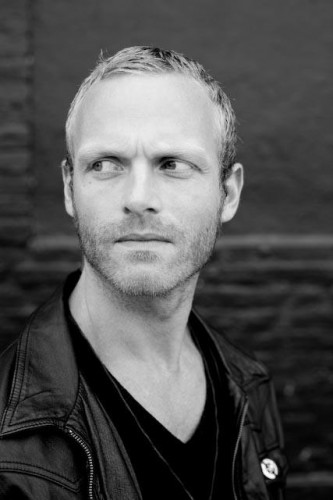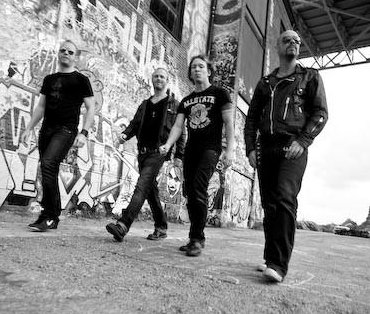Erlend Jegstad of Outshine
by Alissa Ordabai
Staff Writer
 Bred on the fertile ground of the contemporary Swedish rock scene, Outshine reflect many tensions and paradoxes this pressure-cooker environment imprints on its up-and-coming bands. Diverse, robust, competitive and ferociously creative are just a few ways you could describe the Swedish rock underground these days, but still no amount of knowledge about it – from old-school death metal to the current-day 80s glam revival – will prepare you for what Outshine have to offer.
Bred on the fertile ground of the contemporary Swedish rock scene, Outshine reflect many tensions and paradoxes this pressure-cooker environment imprints on its up-and-coming bands. Diverse, robust, competitive and ferociously creative are just a few ways you could describe the Swedish rock underground these days, but still no amount of knowledge about it – from old-school death metal to the current-day 80s glam revival – will prepare you for what Outshine have to offer.
A melting pot of styles from gothic and doom metal to post-punk and grunge, the band instantly stands out from the crowd by not following any one genre, but still managing to sound accessible, transparent, and seamlessly coherent. A lot of it has to do with Morrison-esque authoritative stance of singer Erlend Jegstad, or simply E.J. – a frontman par excellence who single-handedly shapes the band’s identity and distills their own inimitable character from a pool of diverse influences. Those range from Velvet Underground to the Doors to Jeff Buckley, but the way in which E.J. can mix so many favors to produce one unified creative vision is nothing short of genius.
At once highly styled, yet full of swagger, visceral, yet organic, Outshine have managed to hit the jackpot with their newly released album Until We Are Dead as no other Swedish newcomer was able to do before them. If anything, Outshine showcase a different, more subtle and intelligent side to the scene they have emerged from – dark, brooding and clever, but at the same time so confidently poised, you’d want to keep their new record right next to the likes of the Doors, Nine Inch Nails and Iggy Pop on your CD rack.
Tensions between intelligence and sensuality, between the underground and the mainstream, as well as between different members of the band who come from different stylistic backgrounds, are just some of the things HRH discussed with EJ a few weeks after the release of their superb new record.
Hardrock Haven: Hi Erlend! Thank you for finding time for Hardrock Haven and congratulations on the new album.
Erlend Jegstad: Thank you.
HRH: Are you happy with the way this record has turned out?
EJ: Yes, very happy. It was a struggle to get it done, but in the end everyone is really happy.
HRH: Do you think enough time has passed since its release for you to take an objective look at it? And how long does it usually take you to begin seeing your work objectively? Because it’s not your first album, it’s your second full-length release.
EJ: In one way this is our first album because it’s the first album that feels like it’s been properly made. The first album we did on our own, thinking, “Oh, we can do it, we can record and mix it ourselves.” We do like our first album, but with the second one we feel it’s been done in a right way – from production to getting the whole thing done. And I haven’t listened for it for a few months, and then listened to it again the other day and still it feels right. There is no other way to describe it.
HRH: Do you have favorite tracks on this album?
EJ: Me personally or the band?
HRH: You personally.
 EJ: I am not the “heaviest” member of this band [Laughs], so for me it would be tracks like “Ain’t Life Grand” and “I’m Sorry” which reflect my personal preferences.
EJ: I am not the “heaviest” member of this band [Laughs], so for me it would be tracks like “Ain’t Life Grand” and “I’m Sorry” which reflect my personal preferences.
HRH: Outshine is a mix of different characters, and you come from different backgrounds, from different genres of music, so how did you guys get together, how did it all happen?
EJ: Well, basically, I’m Norwegian, but I was living in Sweden, and I didn’t have a band, so me and Jimmy met through an ad in a newspaper. He was looking for a different singer because he’s always been in heavy rock bands and he’s been working with singers who sounded “like a guy from Metallica”, or this guy, or that guy, and he just ended up wanting something different. I gave him an album of my music which was singer / songwriter stuff – just guitar and singing – and this is how we hooked up, me and Jimmy, the guitarist. And then a year later Fredrik, our drummer, joined us. There have been a lot of changes, but the three of us have been together for almost five years now.
HRH: So you’ve been in the current line-up for five years now?
EJ: Yes, the drummer, the guitars, and me, but we kept changing bass players.
HRH: This like Spinal Tap, isn’t it? [Laughs].
EJ: I think we are now on our sixth or seventh bass player. [Laughs].
HRH: Incredible!
EJ: But it’s hard because the three of us have a good chemistry and it’s always something – and not always from our side – that the bass player doesn’t fit. It’s like finding the right girlfriend. Sometimes you don’t like her and sometimes she doesn’t like you. It’s both ways. [Laughs].
HRH: Were there any tensions initially within the band because someone is into heavier music, and other people, like yourself, come from a singer / songwriter background?
EJ: That’s how it was on the first album – constant arguments and compromises because we are so different. Let’s say it takes two hours to make a song and then 20 hours of discussions for everyone to be happy with how it sounds. But in the end all three or four of us are able to say, “Yes, we are really happy with this song now.” But in the beginning there was a lot of tension there.
HRH: It’s quite incredible you say that because the whole album sounds so unified, as if you guys have such a clear idea about who you want to be and what you want to project. And it’s so finely wrought as if you sat down and thought about the entire concept for this band and for this album for a really long time. It sounds like you’ve been working on it for years and it’s now in perfect balance.
 EJ: Thank you very much. But that’s how it is – it took us three or four years to find the sound. On the first album we were compromising in a different way, saying, “This song is going to be more like EJ, and this song is going to be more like Jimmy,” but in the end for the last two years we worked on the sound and the style that is us. It’s such a cliche to say, but it’s been a long journey looking and searching to find the perfect balance.
EJ: Thank you very much. But that’s how it is – it took us three or four years to find the sound. On the first album we were compromising in a different way, saying, “This song is going to be more like EJ, and this song is going to be more like Jimmy,” but in the end for the last two years we worked on the sound and the style that is us. It’s such a cliche to say, but it’s been a long journey looking and searching to find the perfect balance.
HRH: Did you start out with a clear idea of how you wanted to sound on this record and what you wanted to do, or did it all happen spontaneously as you went along?
EJ: No, honestly, I just love singing and what comes out is what we do. I was into so many different styles from the beginning that I don’t feel I have to compromise.
HRH: But how does songwriting work in Outshine? Do you all work on material together, do you all sit together in one room, or do you work on stuff separately and then bring the material to the table?
EJ: Normally we start out with just a guitar riff and then we just jam. Everybody gets in and contributes stuff. Then we argue for fifteen hours and basically that’s it. It starts with a riff and then we all help each other.
HRH: How do vocal melodies come to you? Do they come to you as you go about your daily business or do you have to sit down and isolate yourself?
EJ: [Laughs]. Both yes and no. Basically, when we jam, I don’t have any lyrics, I just sing melody lines, we figure out rhythms and melodies for the songs, and then maybe an idea for a song comes up and then I do things in my own time. I always walk around singing, so it just pops up.
HRH: Wow. Magic.
EJ: I think it’s more to do with the unconsciousness. It’s there somewhere and it just needs time to evolve. It’s jamming and then letting it go for a while, and then it comes back to you. [Laughs].
HRH: Many reviews draw attention to your vocal style. How has it developed? Is it something that you have worked on over the years, something that you have purposefully crafted and carefully constructed, or does it come naturally to you, sort of just comes out and that’s it?
EJ: It’s hard to say. Well, of course a big part of it is technique because I’ve been singing in choirs, I’ve been playing in a lot of different bands, everything from country to folk music, to rock. It’s just what I’ve been influenced by and also what I feel and how I like to sing. If you were listening to me with just an acoustic guitar, I’d sound like someone like Edith Piaf or Tracy Chapman. [Laughs]. In this band I have aggressiveness and anger to me that I’ve never had in other bands. I don’t know if it’s the influence of the guitarist or just the way those songs are written. On this album we are more aggressive, which probably reflects what we’ve been through.
HRH: Who were the singers you looked up to when you were growing up?
EJ: There were many. One singer no-one mentions that I sound like, which I sometimes feel, is Jeff Buckley whom I like. He was a big influence. But when I was younger I also liked Jim Morrison. Bruce Springsteen is another influence. I loved music since I was born, and it’s never been that much about certain genres. I just love what I hear, any guy or girl who can sing well. When I get the feeling, then I like them. Music is a feeling and I’m influenced by everyone who touches my heart.
HRH: When you formed this band five years ago, did you have a clear idea of what your audience was going to be like and who this music was going to be for? I don’t want to say “market”, but what kind of crowd did you have in mind?
 EJ: Jimmy had this band as an ongoing project for a long time before that already, like eight years before I came into the picture. But I think – this is me speaking for Jimmy now – that they knew from day one what they wanted to sound like, but when I came in, it changed a bit. Because you get influenced by people you play with. Basically, we all agreed that there were going to be hard rock riffs, but it was also going to be very dynamic stuff. We don’t like music that’s too technical, we don’t like millions of guitar solos, we don’t like squeezed into one genre. We were after rock or metal with dynamics.
EJ: Jimmy had this band as an ongoing project for a long time before that already, like eight years before I came into the picture. But I think – this is me speaking for Jimmy now – that they knew from day one what they wanted to sound like, but when I came in, it changed a bit. Because you get influenced by people you play with. Basically, we all agreed that there were going to be hard rock riffs, but it was also going to be very dynamic stuff. We don’t like music that’s too technical, we don’t like millions of guitar solos, we don’t like squeezed into one genre. We were after rock or metal with dynamics.
HRH: What are your hopes for this album? What would be the ultimate dream-come-true for this record?
EJ: The ultimate dream is to get the freaking foot through the door. It’s so hard these days. We love to play and everyone in the band really feels that this is a great album, and there are more songs to come. It’s hard when people are afraid to give you a small chance. A foot thorough the door would be good. Give us one chance at Wembley and we’ll fix it ourselves.
HRH: Are you hoping to tour this record?
EJ: We really want to tour with this record. We have toured in the States one time before, but we have to eat too. If we don’t get a sponsorship or don’t have songs on the radio, we’ll have to carry on with an odd concert here and there. But we’d really like to tour.
HRH: What is the Swedish rock scene like these days? Because journalists from outside are getting very mixed signals. Once it was all death metal and doom metal, and the perception was that it was all very dark, and then the other message we are getting is of the glam metal revival, and it’s suddenly all about the 80s. And now an act like yours comes along and we are totally confused.
EJ: I think the whole of Sweden are confused themselves. It’s a little bit of everything. I feel that if you go to rock festivals now, it’s everything from Slash, Guns’n’Roses and Iggy Pop to In Flames. And also before Gothenburg was all about metal, but now there is also indie and pop… I don’t think you can label those cities like you could before – in the 90s or the 80s. That’s my view. I feel it’s everything. Everybody’s trying to be different.
HRH: Is it a healthy environment though? Is it exciting? Is it the place where you want to be?
EJ: You mean the scene in Gothenburg or in Sweden?
HRH: In Sweden in general.
EJ: Yes, I think it’s healthy that there are a lot of styles.
HRH: I mean, you don’t sit there thinking, “Oh, we should really make a break and go to LA”?
EJ: No, the thing with Sweden is that we are a big export of music, but also it’s only eight or nine million people here. How many people are there in Europe? And it almost doesn’t matter if you make it here anymore. That doesn’t mean the rest of the world will find out about you. So in terms of being healthy, the answer is both yes and no. There are a lot of things happening, but, to be honest, I don’t think Sweden is the place where one has to stay forever. That’s my view. I think you need to get out to Europe or the States or wherever.
HRH: Japan?
EJ: Wherever. We played in the U.S. a couple of times and it’s harder there.
HRH: In what way?
EJ: Well, there so many fucking bands there! [Laughs].
HRH: The sheer competition! [Laughs].
EJ: And you need to drive for like 12 hours to get to the next town! [Laughs]. And nobody knows who you are, it’s hard to make a name for yourself. And even though people say that you have to get your stuff on the internet to get noticed, it still feels like you have to be on a label with money to get stuff out. It’s hard to get on the radio on your own. So wish us luck.
HRH: It is a combination of luck and being with the right label, and all sorts of things. But listen, thank you very much for your time. If you ever find yourselves in London, please get in touch for a live review.
EJ: We are hoping to tour, and to get either to London or to Berlin.
HRH: Sure, that would be amazing! And good luck with the record and with touring.
EJ: Thank you very much.
HRH: My pleasure, and thank you for your time.
